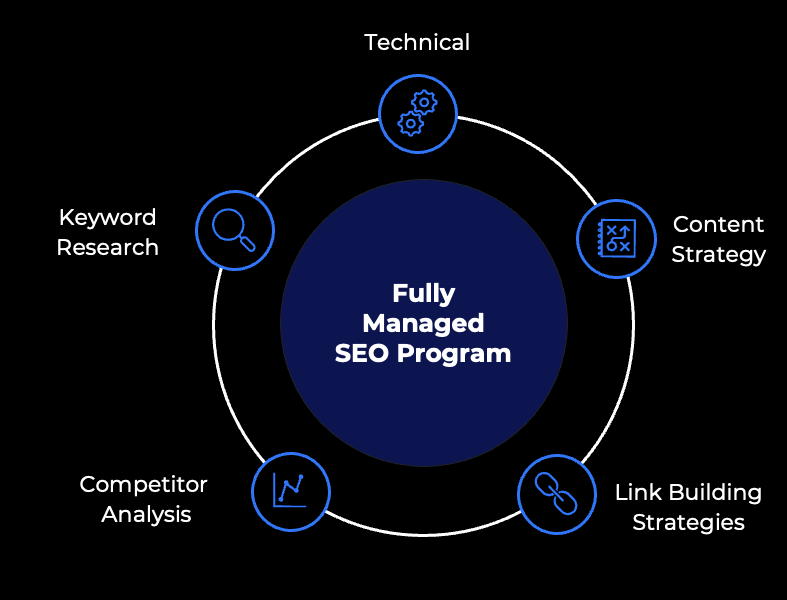What Is An SEO Consultant?
An SEO consultant is a professional who specializes in optimizing websites through organic search. These SEO experts help your company come up with an SEO strategy complete with defined SEO tactics designed to meet your internal KPIs, outrank your competitors, drive quality organic traffic, and convert that traffic into sales and revenue.
Hiring an SEO professional to help out with your SEO strategy will free up valuable time and resources from your digital marketing team.
How do you find the right SEO consultant?
SEO is important in today’s digital landscape because a brand’s website is the first impression to prospective clients. That’s why it’s critical to have your website optimized for organic search and your site’s visitors.
Imagine having a storefront retail shop and you didn’t have any merchandising. An SEO consultant makes sure your online store front is optimized for organic search. Search engine optimization can be confusing when you get started so having the right support to guide you in the right direction will be critical to achieving your business goals.
“Team Lewis’ SEO expertise and ability to package a strategic, tactical, and operational SEO plan has helped our business tremendously. Highly recommend Team Lewis to anyone that is looking for a leader to plan, implement, and manage their SEO strategy.” – Client Testimonial
Most well-known SEO experts, particularly at marketing agencies, are good at overall strategy including:
What SEO tactics do you need a consultant to help you implement?
An SEO consultant will guide you on the following important steps of the SEO process. Your SEO services should address each stage in the SEO process.

- Technical SEO – These days it’s important to pay close attention to your Core Web Vitals scores. Google has been focusing more and more on page load times and UX design. You might be surprised to find out that most web developers don’t pay attention to those details. That’s why it’s important to have an SEO consultant interpret the page load time report to your development team.
- Keyword research and strategy combined with a full-funnel content strategy is critical to grow your website’s share of voice. Your SEO content can be repurposed to feed into your other marketing channels including email marketing, soial media marketing, and paid search campaigns.
- Ongoing Page Optimizations – This includes things like updating title tags, meta descriptions, internal linking, and image optimization.
- Content Creation or Blog Strategy – Building an SEO content strategy is critical to your success. It’s the foundation of all your content marketing efforts. An SEO consultant will help you identify gaps in your content strategy and develop a plan to help you find ownable keywords to dive valuable traffic.
- Offsite SEO (Link building, PR) – Generating votes (links) for your brand campaign is still important in the SEO world. While Google says it’s not as important as it was in the past, having a plan for attracting back links is still important.
- Conversion Rate Optimizations (CRO) – Enhancing the user experience is not only critical to rankings, it’s also important to increasing ROI. The goal of CRO is to convert teh traffic once it gets to your site. A SEO consultant will guide you through the AB testing process so you can figure out what design changes to make to convert your organic traffic at a higher rate.
- Continuous Optimizations – Content gets old and needs to be updated. Having a plan for continuously updating your content is important to keep your top rankings.
How Much Do SEO Consultants Cost and Are They Worth It?
Everyone’s heard of SEO and know it’s important, but many marketers don’t understand the value of SEO. There’s a lot of value in SEO when it comes to ranking for relevant non-branded keywords that have an average cost-per-click associated with it. Every keyword has a value, there is money left on the table if you’re not taking advantage of a solid SEO strategy. Keywords are expensive. For example, if we were to pay for the keyword “SEO Services” that would cost us $15 dollars a click. With over 14k average monthly searches, this keyword’s organic ranking is worth $63,000 dollars a month or $756,000 a year for rank position #1 in Google. That’s how valuable SEO can be for your company. You could ROI your entire SEO investment just by ranking organically for a couple expensive keywords.
Content built for SEO can be stretched beyond your website and the pages of Google’s. There are many benefits for other digital marketing channels including:
Benefits of SEO for Paid Search, Social Media Channels, and Email Marketing
- Ranking for non-branded keywords drives brand awareness and new prospective customers to your site
- Improving page performance and relevancy can improve your quality score in paid search which brings down your CPCs and directly impacts your PPC budget.
- Driving traffic from organic search gros your retargeting lists
- Creating content for SEO feeds into your social media channels
- Creating content with SEO in mind enables you to grow targeted email marketing lists
As you can see, SEO is a very important part of your overall digital marketing success. If you and your team are under pressure to drive revenue and leads, your organic search channel is most likely the one place that will drive the results you’re looking for.
What Are the Qualities of a Reliable SEO Company?
- A good SEO consultant will not promise position one rankings.
- When SEO consulting services are offered, look for a defined strategy and process that makes sense.
- Make sure the SEO consultant understands all aspects of SEO and isn’t too focused on one specific area.
- Look for ways the SEO consultant is focusing on low-lift recommendations that have a high impact on site performance..
- Case study examples and customer testimonials are always good proof they are the real deal.
What Do SEO Consulting Companies Do Exactly?
There are many SEO tools and data points that an SEO consultant uses to analyze your website’s keyword rankings, domain authority and technical health. From there they can assess the ability of your website to perform in Google’s search engine. A good SEO consultation will show you areas that you can improve to win keyword rankings, and therefore get more organic traffic that hopefully will lead to more revenue or leads. First, they will clean up any technical issues that might be holding the site back from ranking. Then, they will work on optimizing all the main webpages to improve page one rankings, and finally, they will look for new keywords to target through new content creation.
Related: Complete SEO Glossary of SEO Terms for Beginners
Why Is SEO a Must for Your Business?
First of all, SEO is often the number one driver of traffic and sales. Search engine traffic through Google is critical for the success of many businesses. You know what they say, “If I don’t see pictures, it didn’t happen.” The same thing goes with a business (particularly small businesses) being found on Google — if your website isn’t discoverable by people who need your services, then you might as well not exist.
How Can SEO Services Increase My Sales?
There are millions of people searching for products and services every day. If you can get in front of people who are actively searching for your products, then there is a good chance they will eventually buy from you. Driving new people to your site through informational content will introduce them to your brand. People often research something before they buy — so if you can find out how people are researching your product or service, then you should create content to answer their questions. Being present on Google builds trust with potential customers, and trust drives sales. As mentioned above, a good SEO strategy will feed into all your other channels like paid search, social media and email marketing. If you start with an SEO strategy, you can leverage the content and traffic in other digital marketing channels.
What Is Lead Generation in SEO?
Much like driving revenue, SEO also drives leads. When you create informational content that potential customers like, they are often likely to give their email in exchange for more great content or for a free guide, template, or eBook. Once you get an email, you can then send the potential customer offers or more information to help guide them to making the final purchase decision. This is called lead nurturing. Understanding your buyer persona and their path to purchase is important when strategizing target keywords and content marketing materials.
SEO Lead Generation Examples
- Downloads
- Contact Us
- Buy Here
- Newsletter Sign Ups
- Webinar Sign Ups
- Retargeting Lists
What Is a Strategy for Improving Ranking?
There are many ranking factors to consider when trying to improve keyword rankings. Understanding all of Google’s algorithm updates over the years will help you better understand what to do and what not to do for improving keyword rankings. There are technical, on-page and off-page ranking factors to take into account. For example, on-page optimizations include having optimized title tags and meta descriptions, as well as contextual keyword phrases to add relevance to the target keyword in the body copy. From a technical SEO standpoint, the webpages should be able to pass Google’s Core Web Vitals performance tests.
The first step in the SEO process is to run a full SEO audit from a technical perspective and then a competitive ranking analysis for a frame of reference. You’ll want to identify where you are and where you want to go, sort of a roadmap for SEO success. From there, you’ll want to prioritize all your top pages to optimize and move through all the top navigational pages and then move through all the blog pages that have page two (positions 11-20) rankings.
The next step in the SEO process is to create new content targeting unique keywords that you’ve found through either conducting keyword research or those gained from your competitive keyword gap analysis. Next, link all of those pages together using keyword-rich anchor text. Finally, getting quality backlinks to your newly optimized pages through an outreach link-building program will boost the page authority to each of those pages which will help them rank higher in Google’s search engine.
The SEO process sounds long and difficult, but a good SEO team will help guide you through all the steps. The sooner you get started, the sooner you’ll get results!
Related: 3 Quick SEO Wins You Can Implement Now
What’s Your Philosophy for Keyword Research?
The main thing is targeting keywords that are relevant to your product or service offering. One good way to tell if you’re targeting the right keywords is to look at your competitor’s keyword rankings. From there, you’ll see what pages are ranking or close to ranking for priority optimization.
Another key to SEO success is to find keywords that aren’t too competitive. Google ranks websites based on many different factors, but one of the main data points to consider is Domain Authority and Page Rank. Some keyword terms have a more competitive search result page than others. For example, the keyword “SEO services” will have more competitive websites ranking versus the keyword “SEO consulting services.” Even though we want to rank for both, we will target the less competitive keyword in order to gain authority on the topic and ultimately rank for our target page for “SEO services.”
So really, look for the following when finding keywords to rank for:
- Keyword difficulty
- Unique keywords
- Competitor keywords
- Relevant keywords
- Keyword intent
- Longer tail keywords with lower competition
- Monthly search volume
How Long Will It Take To See Results?
Every site is different and will respond differently to page refreshes and optimizations. If you have a website that already has a well-known brand name and presence but haven’t implemented an SEO strategy, your site will most likely respond faster and start gaining rankings even faster. Lesser-known brands will have to do a combination of SEO and PR to really get the needle moving. This is because Google counts brand mentions as a ranking signal similar to acquiring a backlink. It can get expensive but once you’re on a roll you should see leads and sales start to increase.
In general, it takes anywhere between three months to a year to build SEO momentum. It’s a long game, so the sooner you get started with your SEO campaign, the sooner you’ll see results.
How Do You Find the Right SEO Consulting Service for Your Business?
With over thousands of SEO companies to choose from, how does anyone possibly know who to go with? It’s good to get referrals from current customers when vetting an SEO agency or consultant. Past performance can be a key indicator of how they’re going to work out for you and your company. Try to figure out your budget and how much your marketing department is willing to dedicate to your SEO strategy. Another thing to think about is who’s going to manage the SEO team. Do you have enough resources internally to be able to implement all the optimizations once they’re made? Can you create all the SEO content that’s going to need to be published in order to gain new keyword rankings? These are all questions you will need to ask yourself and the SEO team you’re talking to. Make sure the SEO team you select is able to assist with the implementation or if they have a team of writers that can supplement the extra blog content that will need to be created.
Finally, make sure to talk to a variety of agencies and consultants and have them pitch you and give you pricing options. After vetting a couple of SEO teams, you should get a good idea of who will be the right fit.
Looking to boost your SEO efforts and win rankings? Check out our SEO services and contact us today!




